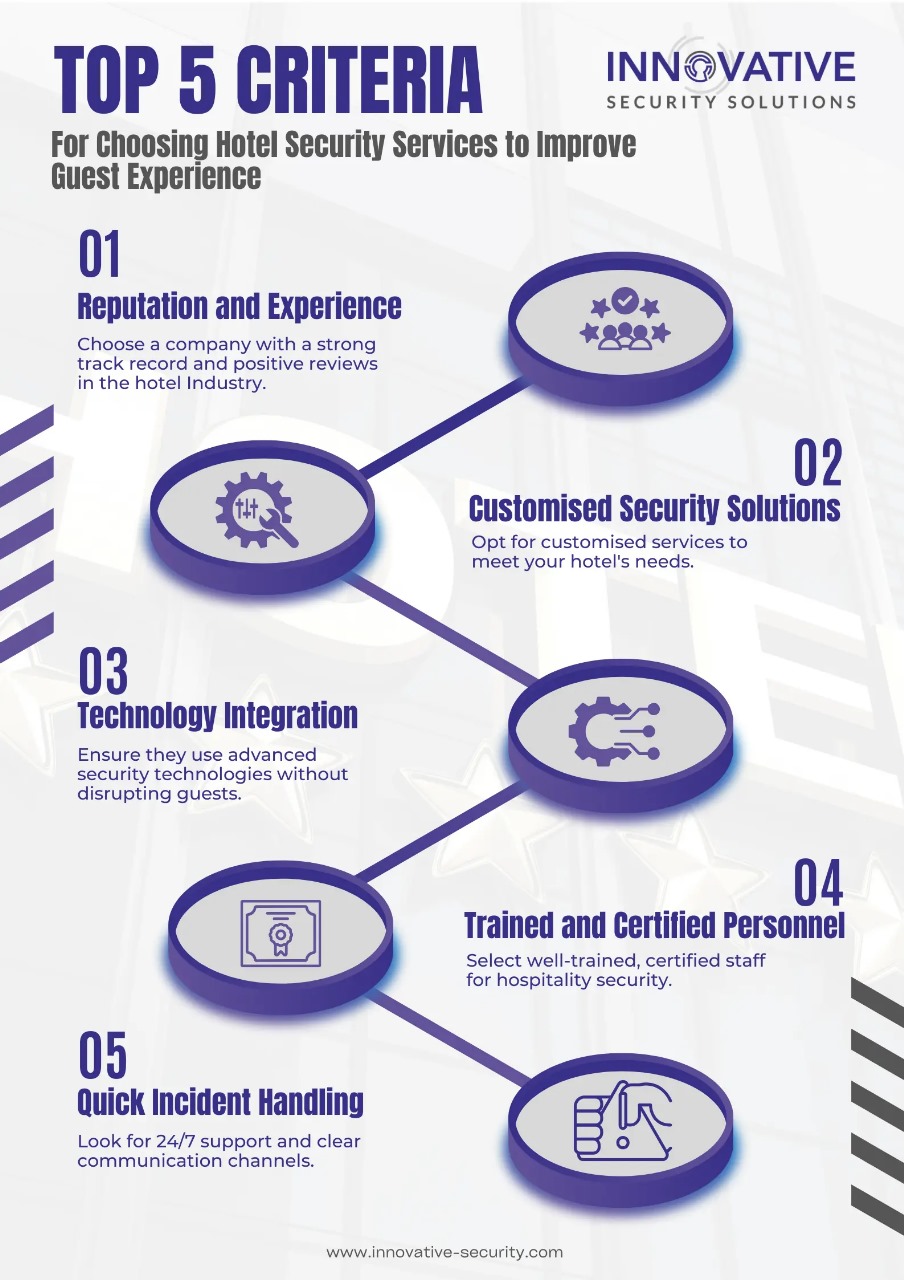Hotel Security Unpacked
Making a hotel feel both welcoming and secure is a tough task. Guests want to feel comfortable and safe while enjoying great service. So, how can hotel managers and security staff set up strong safety measures without making guests uncomfortable? This detailed guide will look at hotel safety and security in the UK.
We’ll give practical tips, real-life examples, and easy steps to help you create a safe and friendly environment in your hotel.
Understanding the Importance of Safety and Security in Hotel Industry
Hotel safety and security isn’t just about preventing theft or ensuring compliance with regulations; it’s about creating a haven for your guests. In the hospitality industry, where trust and reputation are paramount, neglecting safety and security can lead to disastrous consequences.
Why is safety and security crucial in hotels?
- Guest Protection: Ensuring guests feel safe is fundamental to their overall experience.
- Reputation Management: A secure hotel fosters positive reviews and repeat business.
- Legal Compliance: Adhering to safety regulations avoids legal repercussions.
- Operational Continuity: Preventing incidents ensures smooth operations.
Modifying Security Practices to Different Hotel Scenarios
Hotels come in all different types and sizes, from small boutique inns to large resorts. Each hotel has special security needs, so using the same security plan for every hotel won’t work. Let’s look at how you can customise your security measures to suit different types of hotels.
Small Boutique Hotels
Challenges:
- Limited staff
- Personalised guest interactions
Strategies:
- Personalised Security Plans: Develop bespoke security measures modified to your hotel layout and clientele.
- Staff Training: Equip your team with the skills to recognise and respond to security threats.
- Technology Integration: Utilise discreet security technologies like cameras, motion sensors and alarm systems that blend with the hotel’s aesthetics.
Large Resorts
Challenges:
- High guest turnover
- Large premises to monitor
Strategies:
- Comprehensive Surveillance: Implement extensive CCTV coverage across the property.
- Security Personnel: Employ a dedicated security team to patrol and monitor the premises.
- Access Control: Use key card systems and restricted access areas to manage guest and staff movement.
Key Security Measures for Different Hotel Types
Hotel Type | Key Security Measures |
Small Boutique Hotels | Personalised security plans, staff training, discreet technology integration |
Large Resorts | Comprehensive surveillance, dedicated security team, access control |
Urban Hotels | Advanced surveillance systems, guest data protection, emergency preparedness |
Rural Hotels | Local security partnerships, robust perimeter security, guest awareness programs |
Integrating Customer Service Skills into Security Training
Security personnel often interact with guests, making it essential for them to possess strong customer service skills. A security officer who can de-escalate situations calmly and courteously will enhance the guest experience.
Key Customer Service Skills for Security Staff
- Communication: Clear, concise, and friendly communication is vital.
- Empathy: Understanding and addressing guest concerns with empathy fosters trust.
- Problem-Solving: Quick and effective resolution of issues ensures guest satisfaction.
The Role of Security Providers
Security providers play a crucial role in enhancing hotel safety and security. Partnering with experienced security providers can offer several benefits.
Benefits of Partnering with Security Providers
- Expertise: Security providers bring specialised knowledge and experience.
- Resources: They have access to the latest technology and equipment.
- Training: Providers often offer comprehensive training programs for hotel staff.
- 24/7 Monitoring: Many security providers provide around-the-clock monitoring and rapid response services.
Utilizing Cutting-Edge Technology to Ensure Safety Discreetly
Technology plays a pivotal role in modern hotel security. Implementing advanced security solutions can enhance safety without being obtrusive.
Advanced Security Technologies for Hotels
- Smart Cameras: High-definition cameras with facial recognition can help identify potential threats discreetly.
- Mobile Key Systems: Guests can use their smartphones as room keys, reducing the risk of lost or stolen keys.
- AI-Powered Monitoring: AI systems can detect unusual activities and alert security personnel in real time.
Creating a Security-Conscious Culture Among Hotel Staff
A hotel’s safety and security measures are only as strong as those implementing them. Cultivating a security-conscious culture among your staff is crucial for effective safety protocols.
Steps to Foster a Security-Conscious Culture
- Regular Training: Conduct frequent training sessions on the latest security practices and protocols.
- Open Communication: Encourage staff to report any suspicious activities or potential security threats.
- Recognition and Rewards: Acknowledge and reward staff who demonstrate exceptional security awareness.
Train Staff on Emergency Procedures
Ensure all staff are well-versed in emergency procedures to handle any situation effectively.
- Fire Safety: Conduct regular fire drills and ensure staff know the evacuation procedures.
- Medical Emergencies: Train staff on responding to medical emergencies and providing first aid.
- Security Threats: Prepare staff to handle security threats, such as suspicious packages or active shooter scenarios.

Frequently Asked Questions
Common issues include theft, unauthorised access, and emergencies like fires or medical incidents.
Hotels can improve safety by conducting regular risk assessments, training staff, and implementing advanced security technologies.
Procedures should include emergency protocols, guest data protection measures, and guidelines for handling security threats.
The safety and security department is crucial for ensuring the well-being of guests and staff and protecting the hotel's reputation.
Hotels can balance security and hospitality by using discreet security technologies, training staff in customer service, and maintaining transparent communication with guests.

